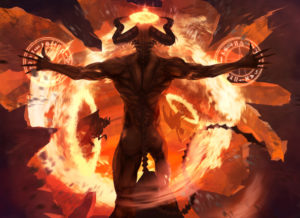
Before humans gained a greater understanding of the world, our ancestors devised stories that attempted to explain its origins and functions. Spirits and deities were thought to govern everything from climate and the movements of celestial bodies to health and illness. Unsurprisingly, many cultures believed that some supernatural entities caused harm to divine and human beings alike. A survey of world religions proves that while demons are thought to be feared and powerful, they don’t just exist within the realms of Abrahamic belief systems and cosmologies.
Demons in Ancient Middle Eastern Cultures
When we hear the word “demon,” we commonly think of fallen angels or malevolent creatures from Christian, Islamic, and Jewish texts. According to the Online Etymology Dictionary, the term itself is descended from the Greek word “daimon,” which can refer to a spirit, a lesser deity, or even a deceased person’s soul.
The Jewish Encyclopedia mentions the Hebrew words “shedim” and “se’irim,” which name specific classes of beings worshipped by some ancient Israelites but denounced by both Old Testament writers and Levite priests. New Testament authors later used “daimon” to denote unclean spirits, but they may have borrowed the term from Jewish authors who purposed it as a Greek translation for “shedim” or “se’irim.” Correspondingly, Islamic texts discuss jinn, a general moniker for unseen supernatural beings regardless of their moral alignment, along with others such as the desert-dwelling ghul and the seductive silah.
Some scholars believe that these concepts entered Abrahamic religious thought from older sources. For instance, Chaldean, Babylonia, Akkadian, and Sumerian myths speak of several classes of spiritual entities:
- Shedu, or storm spirits said to resemble winged bulls
- Demons named for specific ailments such as blindness or leprosy
- Lilitu, a class of female spirits thought to cause disease or kill children by drinking their blood
The Encyclopedia Britannica and writings archived at the Circle of Ancient Iranian Studies also allude to Zoroastrian influence on Jewish religious thought during the Jewish exile in Babylon, possibly resulting in the more complex development of angelology and demonology and the transformation of Satan from a heavenly officer into an adversarial archdemon.
The Asuras of Hindu Mythology
While Middle Eastern belief systems created ideas about good and evil beings, similar concepts in Hinduism emerged and transformed over time. Many Sanskrit writings discuss various asuras, usually depicted as wicked entities who cause trouble for both humans and devas alike. The Rig Veda, a collection of Sanskrit hymns likely composed between 1700 and 1100 B.C.E., simply described them as nature spirits or demigods, while the Puranas usually spoke of them as antagonists. Alongside these are rakshasas, mentioned by the Encyclopedia Britannica as shapeshifters who haunt graveyards, eat human flesh, and drink cows’ udders dry of their milk.
Demons in Other World Religions
The concept of evil spirits isn’t limited to civilizations around the Mediterranean and Indian subcontinent. Chinese folklore describes yaoguai as fallen celestial beings or evil animal spirits who’ve achieved immortality, while yaomo are generally thought to possess dark magical talents. Some Japanese folklore speaks of yokai, supernatural creatures who can cause mischief, terrorize people, or even bring good luck. Evil entities from Indigenous civilizations in the Americas include the atahsaia, a Zuni demon known to lie and prey upon humans and fellow evil spirits, and jumbees, which are mostly malevolent spirits found in the folklore of African-based Caribbean cultures.
Each civilization has cultivated a wide range of ideas to explain mysterious events and forces, ascribing supernatural causes to natural events. Even in an age with expanded scientific knowledge, humans turn to faith, religion, and sometimes superstition to cope with their fear of the unknown. The fascination with demons may be yet another manifestation of that tendency as people try to make sense of a seemingly painful, frightening, and chaotic world.

